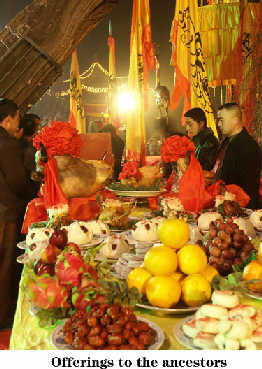 |
Making offerings to the ancestors is one of the most important folk customs of Spring Festival. Traditionally, households prepared for New Year's Eve by bringing their family's genealogical records, ancestral portraits, and memorial tablets to the ancestral hall, where the altar was prepared with incense and offerings. In some regions, offerings were prepared for the deities of Heaven and Earth as well as for the ancestors. In other areas, obeisance was made to the Jade Emperor (the highest deity in the folk pantheon), and the Queen Mother of the West (wife of the Jade Emperor). The offerings, known as "offerings to Heaven and Earth," consisted of mutton, five types of cooked dishes, five colors of snacks, five bowls of rice, two date cakes, and a large steamed wheat-flour bun. The rite was performed by the head of the household. After burning three bundles of incense and bowing to the ancestors, prayers were offered for a fruitful harvest in the coming year. Finally, paper images of money were burned, the smoke carrying the household's prayers and salutations to Heaven. These Spring Festival rituals were a way of wishing the ancestors and deities a Happy New Year.
It was considered imperative to honor the ancestors during Spring Festival, both to remember previous generations and to ensure the continuation of the family line. However, regional differences produced widely differing traditions. In some places, the ancestors were honored before the New Year's Eve feast, while in others the ceremony was conducted at midnight on New Year's Eve. In yet other places offerings were made to the ancestors on New Year's morning, right before opening the door of the family courtyard. In Taiwan, the year's final offering to the ancestors was made in the afternoon of New Year's Day. In some regions, offerings were made to the ancestors at home on New Year's Day, after which the household would travel to the ancestral temple for further ceremonies. In some places, it was customary to conduct the ceremony at the ancestral graveyard, burning incense, making offerings, and bowing to the ancestors. Today, people usually pay their annual respects at the graves of their departed loved ones.

 0
0 







Go to Forum >>0 Comments